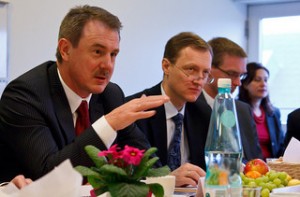 Effective leadership requires intentional thinking, listening and speaking. In the past two weeks I have covered thinking and listening and today I will focus on the more commonly discussed dimension – speaking.
As a leader, what you communicate, how, and when is critical to your organization. It will be impossible to cover all the facets of this here in a short blog, but there are some keys to keep in mind:
Effective leadership requires intentional thinking, listening and speaking. In the past two weeks I have covered thinking and listening and today I will focus on the more commonly discussed dimension – speaking.
As a leader, what you communicate, how, and when is critical to your organization. It will be impossible to cover all the facets of this here in a short blog, but there are some keys to keep in mind:
- What you communicate with your words, body language and attitude often has unintended consequences.
- Being aware and responsible for the “emotional wake” you leave behind you is essential to staying connected with your team.
- Curiosity and inquiry are more effective than domination, negativity, and ignoring.
Let’s explore each of these starting with the unintended consequences.
Unintended Consequences
Each of us has a different point-of-view, perspective and understanding of the world. (For more on this see my blog on the enneagram.) What’s extremely obvious and clear to you isn’t even making it on the radar of some of your team members. And if it is, it could easily be misunderstood and create unexpected consequences. Now these could be positive or negative, but the point is, as a leader, what you say will create an outcome. Because for the most part we are on “automatic pilot” our behaviors and speech are typically instant reactions and largely unexamined. This means your comments may yield outcomes far different than your intentions.
Emotional Wake
The term “emotional wake“ was coined by Fierce Conversations and we think it’s critical for leaders. As a leader, your position in the group has more authority and more impact and the emotions that go along with your words are greatly amplified. It is difficult to overestimate the wake you leave behind you. It’s important that you become more aware of the type of wake you leave. Cleaning up the unconscious emotional additions to your messages will positively impact how well your team functions when you are not there. That, in turn, will increase their effectiveness in reaching the goals and “Yonder Star” you are sharing with them.
Curiosity and Inquiry
If your communications demonstrate vulnerability, openness, and interest, they will invite dialogue about what your team is up to and how they see things. You are more likely to gain insight into their focus, why they are making the choices they are making, and their real priorities. You are much more likely to inspire creativity, innovation, and collaboration. The opposite will happen if you speak in an assumptive or punitive way. People will start to hide things from you, will be afraid of you, and dysfunctional dynamics will take root within your team and organization.
If you are ready, start investigating your own speaking style. First, try to be more reflective and intentional before going into meetings about the outcomes you want to have and how your attitude will impact your team. Second, try speaking less and being more curious. See what you can discover about how people have been hearing you and how this has been impacting their priorities and actions. You might be surprised at what you find out.
photo credit: Baltic Development Forum via photopin cc
